英汉句法现象的对比1
Unit 英汉对比与翻译 (二)

To protect the whale from the cold of the Arctic seas, nature has provided it with a thick covering of fat called blubber. When the whale is killed, the blubber is stripped off and boiled down, either on board down, ship or on shore.
E) By the time he entered college, he had been exposed to English for 6 years. 上大学前,他学英语已经有六年时间了。 英语和汉语句子中语态的使用频率存在一定的差异。被 动语态在英语中的使用比率相对与汉语而言要多。
Nothing was gained by all the over caution. 所有这些谨小慎微,到头来一无所得。 I must have been cheated again. 我准是又上当了。
人们早就怀疑,大气层中 有一个“高温带”, 有一个“高温带” 其中心在距地面约30英里的高空。利用火箭进 其中心在距地面约30英里的高空。利用火箭进 行研究后,这一奇异的事实已得到证实。
A. 时间顺序
In any case, it was the most independent and self-reliant families who were the selffirst to push westward to the Appalachian Mountains, then southward along the mountain valleys, then into the great Central Basin and finally westward beyond the Rockies.
英汉语法对比

(3)词法与句法之间的对应 英语传统语法分为词法和句法。词法依据形态;
句法依据功能。由于形态是功能的表现形式, 因此,这两者的结果是一致的,表现在词法和 句法可以对称,词类和句子成分之间有较明显 的对应关系。徐通锵将这样的语法称为双轨制 语法结构。
英语语法强调避免语法错误,句子结构紧凑,关 系和层次分明。
语句分析顺序,英语是从结构到语义。而汉语是 从语义到结构。
➢ 王冕七岁上死了父亲。
➢ 中国队大胜美国队/中国队大败美国队。
(2)语法单位的清晰与模糊
英语传统语法把语言单位分为词与句子两 级,在此基础上,把语法分为词法和句法, 结构主义语法把语言单位分为语素、词、 短语、分句、句子五级。在英语中,由于 有形态帮助,各级语法单位之间的界限是 清晰的。汉语则不然。
事理上的因果律:先因后果、先假设后可能、 先条件后结果。汉语复句基本上都是先从后 主,即表示原因、条件、假设等一律在前, 表示结果等一律在后。当把原因、条件等看 做补充说明时,根据心理上的重轻律,可以 把它们放在主句之后。
And he knew how ashamed he would have been if she had known his mother and the kind of place in which he was born, and the kind of people among whom he was born.
有形式上保证,英语短语和从句作修饰语 可前可后;主谓倒装、宾语前置都不会被 误解;据连词判断主从;据时态可判断时 间先后。形态丰富的语言不很讲究词序。
句中的作用。
汉语的声调对词和短语的语序起重要作用。
英汉句子对比
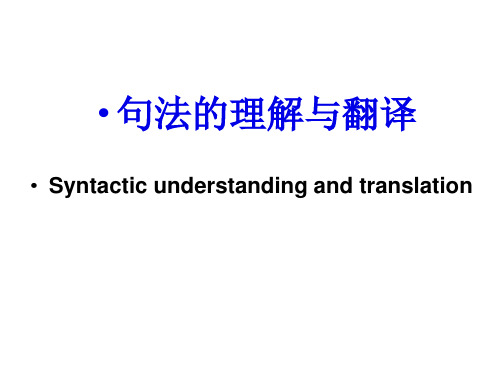
• That region was the most identifiable trouble spot.
• 2.The station chief would have to be close to the director, a member of the inner circle.
A. 英语简单句可转换成汉语复合句
B. 英语并列句、复合句可转换成汉语简单句
A. 英语简单句可转换成汉语复合句
例1:His superior grades at high school enabled him to enroll at the tuition-free Beijing University.
B. 英语并列句、复合句可转换成汉语简单句 例1:He doesn’t know what life means to him.
【译文】他不知道人生的意义。
例2:What troubles me is that I don’t have much experience in this kind of work.
按照逻辑顺序译译文如果一位读者读过18世纪作家的作品体会到其刻意追求典雅的语言风格又读过维多利亚女王时代的人在演讲大厅上所作的庄严的发言他定能更深刻地理解很多现代散文作品那种结构松散口语色彩浓好用俚语不拘形式的语言风格
• 句法的理解与翻译
• Syntactic understanding and translation
【译文】遗传和行为的继承一直是支配环境的惟一方 式, 当这种继承第一次被有意识的选择打破时, 人类历史便开始了。
[关于英汉翻译的论文]传神的英汉翻译例子
![[关于英汉翻译的论文]传神的英汉翻译例子](https://img.taocdn.com/s3/m/ad224a48f6ec4afe04a1b0717fd5360cba1a8dba.png)
[关于英汉翻译的论文]传神的英汉翻译例子关于英汉翻译的论文篇1英汉语言的异同及其翻译策略在英汉翻译中,两种语言在词汇方面的不同主要体现在词的意义,词的顺序和词的搭配能力三个方面;从句法方面来说,英语和汉语在句子结构,句子顺序和其他一些表达方式上则有各自的特点。
下面笔者就从词汇现象和句法现象两方面来探讨英汉的对应程度如何,以及根据这些对比,在进行翻译实践时,应该运用哪些翻译技巧。
1、英汉语言的对比1.1英汉词汇现象的对比其次,从词的搭配能力方面看。
英语和汉语在词的搭配能力上有差异,一个英语单词往往可以搭配很多其他的单词,来表达不同的汉语意思。
以单词“cut”为例,可以用于以下短语之中,如cutcake{切蛋糕},cutwheat(割麦子),cutfingernail(剪指甲)。
由此可见,cut的搭配能力很强,可以用于“cake,wheat,fingernail”,而汉语就需要分别用“切,割,剪”来搭配.在翻译时,要注意英汉语在搭配能力上的差异,译文选词要符合汉语的表达习惯。
如“Sheworeapairofunglaeandawhitedre.”一句中,wear分别搭配了两个名词“unglae”,和“dre”,应译为“戴太阳镜”和“穿连衣裙”.最后,从词的顺序方面看。
英汉句子中主要成分如主语,谓语动词,宾语的词序基本上是一致的。
但是定语的位置和状语的顺序在英汉语中则有同有异,变化多样。
例如,汉语句子“他们在教室里唱歌”,翻译成英语是“Theyareingingintheclaroom.”,汉语中状语“在教室”是放在谓语动词的前面,而英语中状语“intheclaroom”,放在了谓语动词的后面。
又如英语中时间或地点状语之间的排列顺序是从小到大,而汉语的顺序是从大到小。
如“Shewabornat8a.m.onthefirtofOctober,1990.”,译为“她出生于1990年10月1日上午8点。
”另外,定语的位置在英语和汉语中也有差异,英语单词作定语时通常放在它所修饰的词的前面,但有时也后置,如“aninteretingtory”中,定语“intereting”是放在被修饰词“tory”的前面;而“omethingintereting”,当中定语“intereting”放在被修饰的词的后面。
英汉语的句子成分对比

二、英汉语句子主语的句法特 点和语义特点对比
2.形容词作主语
在句法上,英语形容词作主语有两个特点。 第一是前面一般有定冠词 the ,只有当语义相对的形容 词并列出现或前面另有限定词时,the才可以省去。如:
Advanced and backward only exist in comparison with each other.
除了形式上要求的一致,英语中还有概念上的一致 (notional concord)和毗邻关系 (Proximity)对主谓关系也 会产生影响,这就使情况变得更为复杂,因为它们相互之 间有时会发生冲突。
例如: The public are tired of demonstrations· Fifteen years represents a long period of his life. Either my wife or I am going·
汉语被人称为是“得意忘形”的语言(中小龙,1990), 不仅不用任何形式主语,在意思能够被理解的前提下,连 实义主语也常常可以省去。例如: 到时候了,().该休息休息了。 他有个女儿 ,() 在郊区工作 ,() 已经打电话去了 ,() 下午 就能赶回来。 英语中这样的主语是不能省去的。当然,英语也有一 些没有主语的句子,例如: (I)Hope to hear from you soon. (It)Must be very hot in Africa. (You)Go and fetch me some water. 但是 , 这只是一种主语不出现的情况 , 主语是有的 , 只 不过被省略了而已,而汉语中许多没有主语的句子,我们 是很难给它们补出主语来的。
从语义上看,英语和汉语中的主谓关系大体相似。不过, 由于主语、谓语各自的状况存在着差异 , 汉语中主谓之 间的语义关系就要比英语中的复杂。分析主谓之间的 语义关系,通常的做法是按照主谓(尤其是主语和谓语动 词) 之间在意义上的联系来判定主语在句中扮演的语义 角色(semantic role),划分主语的语义类型。 尽管英汉两种语言中主谓语义关系的情况差别不大 , 但 各自的划分方式却明显地不同。英语中的划分比较细 致。R.夸克等人(1985)将英语中的主语按其语义角色分 为10种: 施事 (agentive) 、受事 (affected) 、接受者 (recipient) 、外 力(external causer)、工具(instrument)、事件(eventive)、 状态者(positioner)、地点(locative)、时间(temporal)和替 代(prop ‘it’)。
(英汉句法对比)

二、英语的形态律和贴近律
(一)英语的形态律
the people of China the people who live in China the people living in China
(二)英语的贴近律 It is a truth universally acknowledged, that a single man in possession of a good fortune must be in want of a wife. In spite of this, many people are confident that “The Revealer” may reveal something of value fairly soon. Lydia talked incessantly of lottery tickets, of the fish she had lost and the fish she had won. Whatever he said, was said well; and whatever he did, done gracefully. Between Elizabeth and Charlotte there was a restraint which kept them mutually silent on the subject.
the united efforts of his two unfeeling sisters and of his overpowering friend.
3、事理上的因果律 此情若是长久时,又岂在朝朝暮暮? 夫子步亦步,夫子趋亦趋,夫子驰亦驰;夫子奔亦绝尘,而回瞠若乎后矣。 Every object in the next day’s journey was new and interesting to Elizabeth; and her spirits were in a state for enjoyment; for she had seen her sister looking so well as to banish all fear for her health, and the prospect of her northern tour was a constant source of delight. 4、心理上的重轻律 (二)汉语的音韵律 1、调序规律 2、音节奇偶规律
Leture2 英汉语言对比
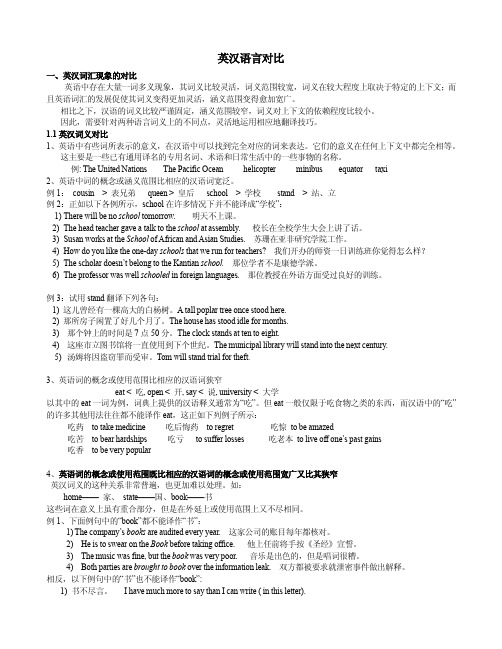
英汉语言对比一、英汉词汇现象的对比英语中存在大量一词多义现象,其词义比较灵活,词义范围较宽,词义在较大程度上取决于特定的上下文;而且英语词汇的发展促使其词义变得更加灵活,涵义范围变得愈加宽广。
相比之下,汉语的词义比较严谨固定,涵义范围较窄,词义对上下文的依赖程度比较小。
因此,需要针对两种语言词义上的不同点,灵活地运用相应地翻译技巧。
1.1英汉词义对比1、英语中有些词所表示的意义,在汉语中可以找到完全对应的词来表达。
它们的意义在任何上下文中都完全相等。
这主要是一些已有通用译名的专用名词、术语和日常生活中的一些事物的名称。
例:The United Nations The Pacific Ocean helicopter minibus equator taxi2、英语中词的概念或涵义范围比相应的汉语词宽泛。
例1:cousin>表兄弟queen>皇后school>学校stand>站、立例2:正如以下各例所示,school在许多情况下并不能译成“学校”:1)There will be no school tomorrow.明天不上课。
2)The head teacher gave a talk to the school at assembly.校长在全校学生大会上讲了话。
3)Susan works at the School of African and Asian Studies.苏珊在亚非研究学院工作。
4)How do you like the one-day schools that we run for teachers?我们开办的师资一日训练班你觉得怎么样?5)The scholar doesn’t belong to the Kantian school.那位学者不是康德学派。
6)The professor was well schooled in foreign languages.那位教授在外语方面受过良好的训练。
英汉语言句法差异概述

英汉语言句法差异概述英汉句子的基本结构都是“主语+谓语+宾语”,但是在形式结构上有较多的差异。
这种差异主要表现在句序和句子结构等方面。
1. 句序的差异A. 修饰语位置差异英语的修饰语,如定语等,既可置于被修饰成分之前,又可置于其后。
但修饰语若为短语或分句,如定语从句等,则一般置于被修饰成分之后,成为后置。
而汉语的修饰语,无论是词、短语或是句子,一般都放在所修饰的词之前,成为前置。
例如:1) The son whom he had turned out had gone to a distant land, and his daughter was dead; so that there was no one left to help the old people.被他赶走的儿子已远走他乡,女儿也去世了,所以没人能帮助这两位老人了。
2) Then the guest called to the old woman who was seated behind the curtain: “Tell me, old woman, what you think concerni ng your former happiness and your present misery.”于是这位客人就大声询问坐在帘子后面的老妇:“告诉我,你对以前的幸福生活和现在的悲惨境况有什么想法?”B. 复合从句的语序差异英语复合句中主句和从句的顺序与汉语有较大的差异。
以状语从句为例,时间状语从句可以在主句之前,也可以在主句之后,叙述顺序灵活,而汉语则通常先发生的事先叙述,后发生的事后叙述;英语的因果状语从句中,表示原因的从句可以放在主句之前,也可以放在主句之后,汉语一般是“因”在前,“果”在后;英语的条件从句位置也较为灵活,可以放在表示结果的主句之前或之后,汉语中常常为条件在前,结果在后。
例如:1) It suited their master to have them in his service, since the old people had been in authority themselves, and so knew how to do things.因为老夫妇曾经是主人,知道怎么干活,所以穆罕默德有他们服侍自己,感到称心如意。
英汉语言句法差异对比及翻译策略探析
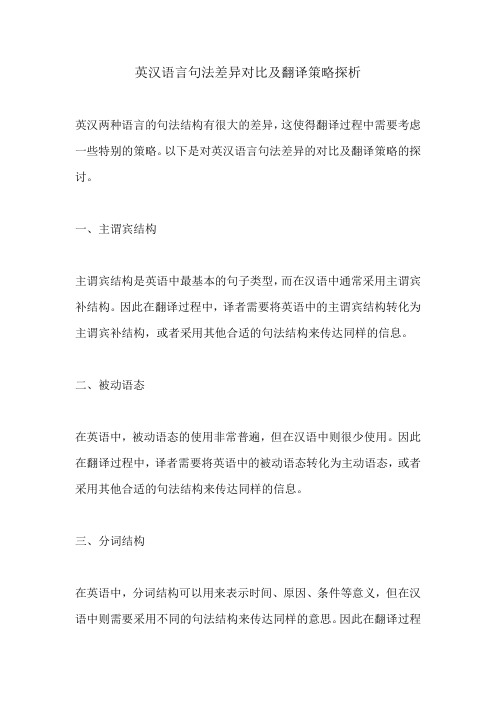
英汉语言句法差异对比及翻译策略探析
英汉两种语言的句法结构有很大的差异,这使得翻译过程中需要考虑一些特别的策略。
以下是对英汉语言句法差异的对比及翻译策略的探讨。
一、主谓宾结构
主谓宾结构是英语中最基本的句子类型,而在汉语中通常采用主谓宾补结构。
因此在翻译过程中,译者需要将英语中的主谓宾结构转化为主谓宾补结构,或者采用其他合适的句法结构来传达同样的信息。
二、被动语态
在英语中,被动语态的使用非常普遍,但在汉语中则很少使用。
因此在翻译过程中,译者需要将英语中的被动语态转化为主动语态,或者采用其他合适的句法结构来传达同样的信息。
三、分词结构
在英语中,分词结构可以用来表示时间、原因、条件等意义,但在汉语中则需要采用不同的句法结构来传达同样的意思。
因此在翻译过程
中,译者需要将英语中的分词结构转化为汉语中合适的句法结构。
四、倒装结构
在英语中,倒装结构可以用来表示强调、疑问等意义,但在汉语中则需要采用不同的句法结构来传达同样的意思。
因此在翻译过程中,译者需要将英语中的倒装结构转化为汉语中合适的句法结构。
总体来说,英汉两种语言的句法结构差异较大,因此在翻译过程中,译者需要根据具体情况采用不同的策略来传达同样的意思。
需要注意的是,翻译过程中的准确性和流畅性都非常重要,因此译者需要对两种语言的语法和句法结构有深入的了解和熟练的掌握。
英汉句子结构对比

所谓意合,顾名思义,无须所谓的逻辑标记,句子靠意思,就能“捏 ”在一起,为听者或读者所接受。如上句的对应汉语说法:迟了,我 得走了。试比较以下的英汉表达之异:
An Englishman who could not speak Chinese was once travelling in China. Version 1: 一个英国人,不会说中国话,有一次在中国旅行。 Version 2: 一个不会说中国话的英国人有一次在中国旅行。
英汉句子结构对比研究 Contrast of Sentence Structure Between Chinese and English
主讲人:王巧花
赵金玉
Outline
1 英汉基本句型比较
2 英汉句子建构法则与拓展模式
3 英汉句子结构的差异
1 英汉基本句型比较
1.1 英语的基本句型
英语句子的谓语是动词性谓语,由动词或动词加补足成分构成重后饰(back modifier);汉语:重前饰(preceding modifier)
英语与汉语就句子的逻辑重心而言,英语惯于前置,“先声” 夺人;汉语多后移,“后发”制人。从“语序”看,虽然在各自的语 法中具有同等的重要性,且通常都采用“主谓宾”(SVO)的线性排列顺 序,然而,英汉在修饰语(定语和状语)的位置处理上存在着一个显而 易见的差异。英语的修饰语既可置于被修饰成分之前,又可置于其后 ,但此修饰语若为短语或分句,则往往置于被修饰成分之后。值得注 意的是,汉语的修饰语无论是词、短语或是句子,其位置一般处于被 修饰成分之前。英语以“尾重”(end weight)为美,而这种“美”多半 依靠“重后饰”的表达习惯造就。 The diagnosis seems in every case to correspond exactly with all the sensations that I have ever felt. 每次看病的诊断似乎都和我的感觉不谋而合。
英汉句法结构对比与翻译

英汉句法结构对比与翻译
1.语序:英语的语序为主谓宾结构,即主语+谓语+宾语;汉语的语序
为主谓宾结构或主宾谓结构,即主语+(宾语)+谓语。
因此,在翻译时需
要注意将英语的主宾关系转换为汉语的主宾或主谓关系。
2.主谓一致:英语中,主语和谓语动词的数和人称要一致;汉语中,
主谓之间没有要求一致。
翻译时要注意这种差异,尽量在译文中保持一致。
3.助动词:英语中助动词的使用较为普遍,用于构成各种时态、语态
和概括性表达;汉语中没有助动词,时态、语态等信息主要通过上下文或
其他词语表达。
在翻译时要根据具体情况选择合适的翻译方式。
4.从句结构:英语中从句的引导词较多,从句可以作为主语、宾语、
状语等;汉语中从句的引导词较少,从句通常作为主语、宾语、状语等存在,但位置较灵活。
在翻译时要注意将从句准确地引导出来。
翻译时,首先要理解英语句子的句法结构,包括主谓宾关系、时态、
语态等,然后将其转换为对应的汉语句法结构,并进行适当的调整和转换,以保持目标语言的语法正确性和自然度。
总之,英汉句法结构对比与翻译是在语言结构和用法上的相互比较和
互相转换,要求理解和掌握两种语言的句法规则和差异,并在翻译过程中
灵活运用。
英汉对比研究(1)

名词优势造成造成介词优势,使英语的静态倾向更为显著。 He is at his books. (He is reading books) 他在读书。 He has someone behind him. (Someone supports him) 有人给他撑腰。
18
由于以上的特点,英汉互译的过程往往是静态与动态互相转换的过程。
打肿脸充胖子,吃亏是自己。 If you get beyond your depth, you will suffer.
9
紧缩句与成语
墙倒众人推。 When a man is going down-hill, everyone will give him a push. 不到黄河心不死。 Until all is over, ambition never dies.
4
形合和意合 ( Hypotactic vs. Paratactic )
2. 介词 (介词是英语里最活跃的词类之一,是连接词、语或从句的重要手段。 英语造句几乎离不开介词,汉语则常常不用或省略介词。)
The many colors of a rainbow range from red on the outside to violet on the inside. 彩虹有多种颜色,外圈红,内圈紫。 He had a disconcerting habit of expressing contradictory ideas in rapid succession. 他有一种令人难堪的习惯;一会儿一个看法,自相矛盾,变 化无常。
24
4.被动与主动 ( Passive vs. Active )
被动语态在英语里是一种常见的语法现象。
英汉语言对比

汉英翻译的理论基础—汉英语言对比3.汉英句法对比3.1.汉英思维方式比较:傅雷:东方人与西方人的思维方式有基本分歧,我人重综合,重归纳,重暗示,重含蓄;西方人则重分析,细微曲折,挖掘唯恐不尽,描写唯恐不周。
汉语学家王力:西洋语法是硬的,没有弹性;中国语法是软的,富有弹性。
……所以中国语法以达意为主。
英国人写文章往往化零为整,而中国人写文章却往往化整为零。
⏹西方人重形式论证,崇尚个体思维,重分析。
表现在语言中,重形合,不求全面、周到,但求结构上的严谨。
⏹汉民族重悟性,重整体、重综合。
在语言表达上重意合。
语言简约、模糊,语义较笼统、朦胧,形散而神聚。
汉语注重注重形象思维,惯于将事物具体话:四字格词语(成语):形象鲜明,形式对称,音韵和谐。
讲究结构的对仗和文采的华丽。
其词义往往虚实杂糅,甚至有繁复重叠之处。
(混水摸鱼,五光十色,画饼充饥,开门见山)3.2 英汉句法差异(语言结构)英语重形合(hypotaxis) ,形合是指句中的词语或分句之间需要一种语言形式手段连接起来,表达一定的语法意义和逻辑关系。
具体说来,英语的句子通常以主谓结构为主干,以谓语动词为中心,借助诸如分词、介词、连词、关系代词、关系副词之类的明示的连接手段,使句子呈现出由中心向外扩展的结构。
注重结构的完整,以形显义。
There are various categories of bag ladies: those who live on the streets, claiming they enjoy the freedom from constraints of society; those who became homeless because a relative died or because they c ouldn’t keep up rent payments, and they didn’t know where to go or how to apply for relief; and quasi bag ladies who have an anchor point --- a sister or brother whom they can visit once in a while to take a bath.汉语重意合(parataxis) ,意合是指词语或句子之间不用语言形式手段进行连接,句中的语法意义和逻辑关系通过词语或分句的含义来表达,是隐形的连贯,注重逻辑事理顺序,以神统形。
英汉语言对比
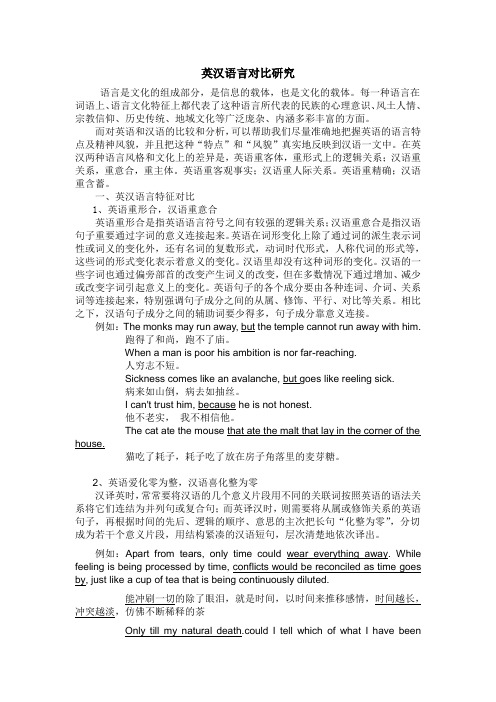
英汉语言对比研究语言是文化的组成部分,是信息的载体,也是文化的载体。
每一种语言在词语上、语言文化特征上都代表了这种语言所代表的民族的心理意识、风土人情、宗教信仰、历史传统、地域文化等广泛庞杂、内涵多彩丰富的方面。
而对英语和汉语的比较和分析,可以帮助我们尽量准确地把握英语的语言特点及精神风貌,并且把这种“特点”和“风貌”真实地反映到汉语一文中。
在英汉两种语言风格和文化上的差异是,英语重客体,重形式上的逻辑关系;汉语重关系,重意合,重主体。
英语重客观事实;汉语重人际关系。
英语重精确;汉语重含蓄。
一、英汉语言特征对比1、英语重形合,汉语重意合英语重形合是指英语语言符号之间有较强的逻辑关系;汉语重意合是指汉语句子重要通过字词的意义连接起来。
英语在词形变化上除了通过词的派生表示词性或词义的变化外,还有名词的复数形式,动词时代形式,人称代词的形式等,这些词的形式变化表示着意义的变化。
汉语里却没有这种词形的变化。
汉语的一些字词也通过偏旁部首的改变产生词义的改变,但在多数情况下通过增加、减少或改变字词引起意义上的变化。
英语句子的各个成分要由各种连词、介词、关系词等连接起来,特别强调句子成分之间的从属、修饰、平行、对比等关系。
相比之下,汉语句子成分之间的辅助词要少得多,句子成分靠意义连接。
例如:The monks may run away, but the temple cannot run away with him.跑得了和尚,跑不了庙。
When a man is poor his ambition is nor far-reaching.人穷志不短。
Sickness comes like an avalanche, but goes like reeling sick.病来如山倒,病去如抽丝。
I can't trust him, because he is not honest.他不老实,我不相信他。
英汉对比(1) 英语翻译

1)He didn’t half like that girl.(=He liked her very much) 他非常喜欢那姑娘。 2)I couldn’t feel better. (=I’m feeling first-rate) 我觉得身体好极了。
2.1.6替换和重复
英语比较忌讳重复,因而常用替代、省略 和变换的表达方法;相比之下,汉语则比 较习惯于重复,因而常用实称、还原和复 说的表达方法。
在句子构造中,汉语并不把主语看成必要的 成分。正如王力所说:“就句子结构而论, 西洋语言是法治的,中国语言是人治的。法 治的不管主语用得着用不着,总要呆板地求 句子形式的一律,人治的用得着就用,用不 着就不用,只要能使人听懂说话人的意思, 就算了。”
课内练习
现在请大家通过翻译以下的简单句子熟练掌握这一技巧
汉语常用散句、松句、紧缩句、省略句等, 以中短句居多,最佳长度为7至12字。书面 语虽也用长句,字数较多,结构较复杂, 但常用标点把句子切开,与英语相比,还 属短句。没有标点符号的一气呵成的类似 英语的那种长句在汉语里是不正常的(例如 本句)。汉语句子多数显得结构简化,无拖 沓、盘错之感,“甚至有些西洋人看见了 中国作品的译文,觉得简短可爱。”
现代汉语受西方语言的影响,句子也比清 代以前的长了,虽然如此,仍比不上英语。 王力指出:“固然,现代的思想已经不是 四字短句所能表达的了;但是我们希望顺 其自然,适可而止。如果把句子勉强拉长 到和中国的语言结构不能相容的地步,就 未免太过了。”
2.1.5间接和直接
英美民族富于幽默,表达时常常不把要说 的话直接说出来,而是用某种间接、含蓄 的方式来陈述。汉语也有含蓄表达法,但 较常用作修辞手段。总的说来,汉语比较 倾向于直截了当,而英语则比较常用克制 陈述、间接肯定、委婉否定和婉转暗示的 表达方式。
英汉句法结构对比与翻译
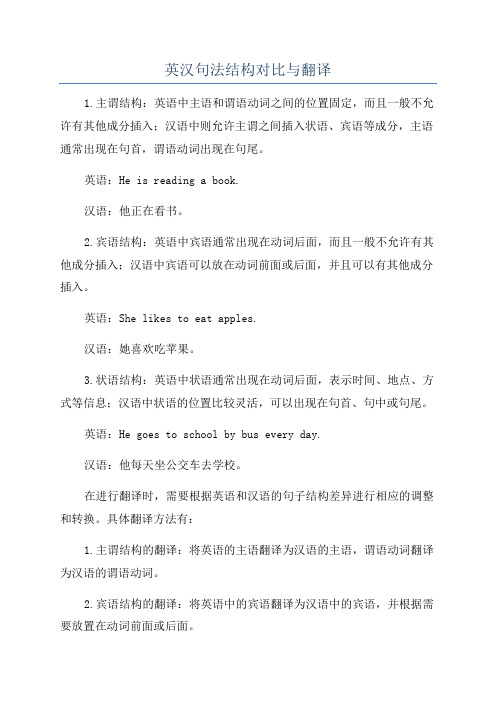
英汉句法结构对比与翻译
1.主谓结构:英语中主语和谓语动词之间的位置固定,而且一般不允许有其他成分插入;汉语中则允许主谓之间插入状语、宾语等成分,主语通常出现在句首,谓语动词出现在句尾。
英语:He is reading a book.
汉语:他正在看书。
2.宾语结构:英语中宾语通常出现在动词后面,而且一般不允许有其他成分插入;汉语中宾语可以放在动词前面或后面,并且可以有其他成分插入。
英语:She likes to eat apples.
汉语:她喜欢吃苹果。
3.状语结构:英语中状语通常出现在动词后面,表示时间、地点、方式等信息;汉语中状语的位置比较灵活,可以出现在句首、句中或句尾。
英语:He goes to school by bus every day.
汉语:他每天坐公交车去学校。
在进行翻译时,需要根据英语和汉语的句子结构差异进行相应的调整和转换。
具体翻译方法有:
1.主谓结构的翻译:将英语的主语翻译为汉语的主语,谓语动词翻译为汉语的谓语动词。
2.宾语结构的翻译:将英语中的宾语翻译为汉语中的宾语,并根据需要放置在动词前面或后面。
3.状语结构的翻译:将英语中的状语翻译为汉语中的状语,并根据需要放置在句首、句中或句尾。
需要注意的是,不仅要考虑句子结构的差异,还要考虑语言的习惯表达方式和上下文的语境。
对于复杂的句子结构和长篇文章的翻译,还需要进行更加细致的分析和翻译。
英汉词汇现象的对比-词序

替换主语以符合英语表达
一. 鲁迅的骨头是最硬的,他没有丝毫的奴颜和媚骨,这是 殖民地半殖民地人民最可宝贵的性格。
Lu Hsun was a man of unyielding integrity, free from all sycophancy-拍马屁,奉承 or obsequiousness-谄 媚; this quality is invaluable among colonial and semi-colonial people.
单击此处添加大标题内容
胎又瘪了。 We’ve got another flat tire. 找出译文中合适的主语 世纪之交,中国外交空前活跃。
○ The turn of the century finds China most active on the diplomatic arena.
○ At the turn of the century, China is most active in its diplomatic activities.
汉语:按时间顺序和逻辑发展关系由先到后、由因到果、由假 设到推论、由事实到论证,习惯于问题解决型模式 (Problem-solution Pattern) 。
例如:
It was keen disappointment that I had to cancel the visit I had intended to pay to Hong Kong On July 1St. 我原先打算七 月一日去香港旅游,后来不得不取消,这使我很扫兴。
英汉句法结构对比

英汉句法结构对比
1.语序差异:英语采用SVO(主语-谓语-宾语)的语序,强调语法角色
之间的顺序关系。
汉语一般采用主谓宾的语序,强调句子的主题和信息重
要性。
2.修饰成分:英语中修饰成分一般位于被修饰词之前,如形容词放在
名词之前,副词放在动词之前。
而汉语中修饰成分一般位于被修饰词之后,如形容词放在名词之后,副词放在动词之后。
3.从句结构:英语中从句结构比较灵活,可以位于主句中的任何位置。
汉语中从句结构相对固定,通常位于主句之前或之后。
4.动词结构:英语中动词的变化较为复杂,有时需要辅助动词来表示
时间、语态等。
汉语中动词的变化相对简单。
这些对比点只是一部分,实际上英汉句法结构对比是一个非常复杂的
问题,受到语言的特点、文化背景等多种因素的影响。
- 1、下载文档前请自行甄别文档内容的完整性,平台不提供额外的编辑、内容补充、找答案等附加服务。
- 2、"仅部分预览"的文档,不可在线预览部分如存在完整性等问题,可反馈申请退款(可完整预览的文档不适用该条件!)。
- 3、如文档侵犯您的权益,请联系客服反馈,我们会尽快为您处理(人工客服工作时间:9:00-18:30)。
偏 句 正 复 句
转 折 假 设 条 件 因 果 目 的 取 舍
1.虽然(虽、尽管)A,但是(但、于是、而)B 2.但是 然而 可是 却 3. 只是 不过 倒(让步:虽然、尽管、即使、就 算)
主从复合句→联合复句(顺承关系)
2).No sooner had I got home than it began to rain. 我一回到家里,雨就下了起来。
主从复合句→联合复句(顺承关系)
3).Think it over and you’ll find a way. 如果你认真想一想,你就会想出办法来。
复合句 并列复合句 并列连词和连接副词:and, so, therefore, not only…but also…, neither…nor…, or, otherwise, or else, either…or…, but, yet, still, however, while, whereas, for 主从复合句 ①.从属连词:that, before, after, whether, if, since, although, when because, as soon as, as long as ②.疑问代词:what, who, which, whom, whose ③.疑问副词:when, why, where, how ④.关系代词:that, which, who, whose, whom ⑤.关系副词:when, why, where
4. They don’t understand it profoundly. 他们并不深刻了解这一点。 5. On May 26,1958,Westinghouse completed a small nuclear reactor for the production of civilian electric power at Sippingport, Pennsylvania, with a capacity of 60,000kilowatts. 1958年5月26日威斯汀豪斯公司在宾夕法尼亚州希平波特建立一座 为生产民用电力的小型核反应堆,容量为6万千瓦。
1.如果(假如、倘若)A,就B 2.即使(就算、哪怕)A,也B、再A,也B
1.只要A,就B 2.只有(除非)A,才B 3.无论A,都B 1.因为A,所以B、因此 、因而、2.之所以B,是因为A、3.既然(既)A,那么(就)B 1.以、以便、用以、好、为的是、2.以免、免得、省得 1.与其A,不如(宁可)B 2.宁可(宁愿)A,不(不愿)B
P26
第三章、第二节
英汉句法现象的对比(句子结构)
一、Revision
1.It is the world’s outstanding examples of self-reliance--in the most massive scale. 这是全世界自力更生的杰出榜样—而且是规模最大的。 2.Being the first head of government of Belgium to be received in China, I am conscious of taking part in a kind of accomplishment. 作为中国接待的第一个比利时政府首脑,我意识到自己在完成一种 使命。 3.In the United States many traditional expressions of care and concern that were once part of personal relationships have been popularly used in small businesses and government offices. 在美国,许多曾经用在私人关系方面的表示关爱的传统表达法 现在 也在小企业和政府机关广泛使用。
5.主动语态←→被动语态 1).The lost child was found after three days. 失踪的男孩三天后找到了。 2).The light has been turned off by Xiao Ming. 小明把灯熄了。 3).A snake bit him. 他被蛇咬了。 三、Exercises 1). “Get out of here!” shouted the doorkeeper. “滚出去!”守门人吼道。(倒装句→正装句) 2).Pressure of work has somewhat delayed my answer. 由于工作忙,答复迟了一些。(简单句→复合句) 3).When I negotiate, I get nervous. 谈判时我总有点紧张。(主从复合句→简单句 )
二、句子结构
并 列 关 系
1 也 又 还 同时 同样
2
也A,也B 又A,又B 既A,也(又)B 一方面A,(另)一方面B 有时A,有时B 一会儿A,一会儿B 一边A,一边B
复
联 合 复 句
3 不是A,而是B
顺 承 关 系 选 择 关 系 递 进 关 系
是A,不是B
1 就 便 才 于是 然后 后来 接着 跟着 2 首先A,然后B 起先A,后来B
并列复合句→偏正复句(假设关系)
4).We have studied English for only a year, yet we can act English plays already. 虽然我们才学了一年英语,但我们已经能够演英文剧了。
并列复合句→偏正复句(转折关系)
4.倒装句→正装句 1).Out rushed a little boy. 一个小男孩冲了出来。 2).Never have I read a book like this. 我从未读过这样的书。
1.简单句→复合句 1).The teacher came in, followed by his students. 老师进来了,他的学生跟着他(后面跟着他的学生)。 2).Without his knowledge, the matchmakers were at work. 他自己还不知道,媒人却已为他穿针引线了。 3).Her coming home late worried her mother. 由于她回家晚了,她的妈妈很担心。 2. 复合句→简单句 1).It’s four years since I came here. 我来这里已经四年了。 2).What he said is reasonable. 他的话很有道理。 3.主从复合句→其他 1).My jeep was straining up when the radiator began to leak. 我的吉普车正吃力地往上爬,这时水箱开始漏水了。
4).With much difficulty did she find her way home. 她 好不容易回到了家。 (倒装句→正装句、正面表达→反面表达) 5).Nothing is gained by all the overcaution. 所有这些谨小慎微的措施到头来是一无所得。(被动语态←→主动语态) 6).Stike while the iron is hot. 趁热打铁。 7).The visitors were struck by the beauty of the West Lake. 游客被西湖的美景迷住了。 8).The workers are on strike. 工人在罢工。 9).He likes playing basketball and football. 他喜欢打篮球,也喜欢踢足球。 10).This is the bridge built in 1958. 这是一九五八年建的那座桥。
